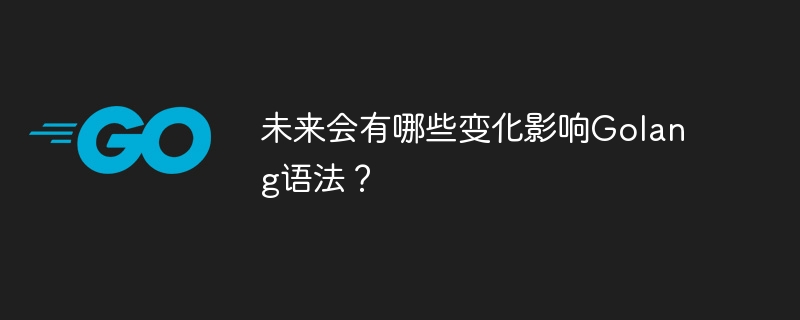

What changes will affect Golang syntax in the future?
With the rapid development of technology and the continuous updates in the field of programming, programming languages are also constantly changing and evolving. As an efficient and concise programming language, Golang has always been loved by developers. In the future, Golang's syntax will also be affected by some changes, which may come from technological development, industry needs, or optimization of the language itself. This article will explore several aspects that may affect Golang syntax in the future and give specific code examples.
1. Generics
Generics are currently one of the most anticipated features by Golang users. Generics can make code more flexible and versatile, making it easier for developers to write reusable code. In the future, Golang is expected to introduce generic features, which will help improve code readability and reduce the writing of repetitive code.
Sample code:
package main
import "fmt"
func findMax[T comparable](input []T) T {
max := input[0]
for _, val := range input {
if val > max {
max=val
}
}
return max
}
func main() {
numbers := []int{1, 5, 3, 9, 2}
maxNum := findMax(numbers)
fmt.Println("The maximum number is:", maxNum)
strings := []string{"apple", "banana", "cherry"}
maxStr := findMax(strings)
fmt.Println("The maximum string is:", maxStr)
}2. More powerful error handling mechanism
Golang’s current error handling mechanism mainly relies on returning an error value to determine whether the function is executed successfully, which is relatively cumbersome. In the future, Golang may provide a more convenient and unified error handling mechanism so that developers can handle error situations more easily.
Sample code:
package main
import (
"fmt"
"errors"
)
func divide(x, y int) (int, error) {
if y == 0 {
return 0, errors.New("cannot divide by zero")
}
return x / y, nil
}
func main() {
result, err := divide(10, 2)
if err != nil {
fmt.Println("Error:", err)
} else {
fmt.Println("Result:", result)
}
result2, err2 := divide(10, 0)
if err2 != nil {
fmt.Println("Error:", err2)
} else {
fmt.Println("Result:", result2)
}
}3. More flexible concurrent programming support
Golang is famous for its powerful concurrent programming support, but in some scenarios, developers may feel that the way concurrent programming is handled is slightly awkward. Cumbersome. In the future, Golang may provide a more flexible and convenient concurrent programming mechanism, allowing developers to handle concurrent tasks more conveniently.
Sample code:
package main
import (
"fmt"
)
func multiply(x, y int, c chan int) {
result := x * y
c <- result
}
func main() {
c := make(chan int)
go multiply(10, 5, c)
result := <-c
fmt.Println("Result:", result)
}Summarize:
With the continuous development of technology, Golang's syntax will continue to evolve and be updated. In the future, Golang may introduce generics, improve error handling mechanisms, and provide more powerful concurrent programming support, allowing developers to write code more efficiently. The sample code above demonstrates some possible changes and their effects. It is hoped that Golang in the future can better meet the needs of developers and make programming simpler and more efficient.
The above is the detailed content of What changes will affect Golang syntax in the future?. For more information, please follow other related articles on the PHP Chinese website!
 Application of artificial intelligence in life
Application of artificial intelligence in life
 What is the basic concept of artificial intelligence
What is the basic concept of artificial intelligence
 What is blockchain web3.0
What is blockchain web3.0
 What does STO mean in blockchain?
What does STO mean in blockchain?
 How to make money with blockchain
How to make money with blockchain
 What is the inscription in the blockchain?
What is the inscription in the blockchain?
 Four major characteristics of blockchain
Four major characteristics of blockchain
 Get window handle method
Get window handle method




